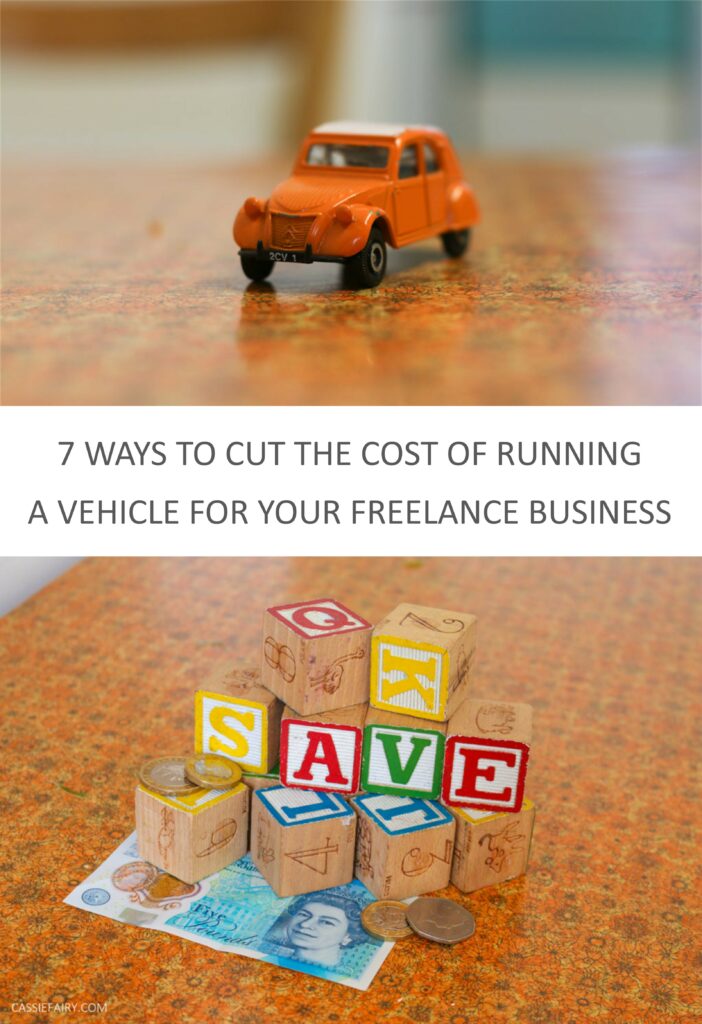
Earlier this week, I wrote about how to make your office feel like a home away from home and today, I’m focusing on the transport you use to carry out your business tasks. Not only is it possible to save money on the running costs of your car or van in general (yes, I’m hoping this post will help everyone!) but it’s also possible to claim business tax relief for your vehicle, too.
Here are some tips on ways to save money and claim expenses on your car costs as a small business owner:
Tax relief on mileage
If, like me, you’re a sole trader, you can certainly claim tax relief on the cost of running a vehicle for your business, including insurance, maintenance, vehicle licence fees, even fuel and parking. When you go through your accounts with a freelancer accountancy professional, you’ll be able to figure out exactly what expenses you can use on your balance sheet.
If you’re doing your accounts yourself, there’s an easy way to claim tax relief when you use a car for business purposes. Look on the Gov.uk website where you can find the simplified expenses rate for travel costs, which allows you to claim tax relief on the mileage you do for work purposes. That way, you only need to record the miles you travel and then multiply it by the flat rate to work out how much you can claim back as a business expense.

Vehicle running costs
I’ve previously shared some of the things I wish I had known when I bought my first car, which included the paperwork/history of the vehicle and servicing. But I didn’t cover one of the biggest expenses – fuel. This is particularly true now that petrol and diesel are at sky-high prices and the type of vehicle you run will impact on how much fuel it consumes. So, when you’re buying a vehicle for your work, consider this ongoing running cost and how many miles to the gallon the vehicle will achieve.
Where you buy fuel can make a big difference to how much you end up spending on those miles to and from your business activities. Supermarkets can often be cheaper and they conform to the same standards as branded fuel. Unless you really feel like you’re getting value from it or have a high-performance vehicle, don’t pay extra for premium fuel. Work out what fuel works best for your car (petrol or diesel engine, hybrid, electric) and then find the best place to fill up locally, with the best prices.
Buy economical tyres but don’t simply go for the cheapest option. Cheap tyres increase stopping distance, compromise handling and minimise fuel economy. So, it pays to shop around for good quality tyres while also keeping the cost in mind – you can compare prices online to find the best deals. You should also regularly check the pressure of your tyres as this will have an effect on all these factors too.

Cars are less effective when cold but there are different ways to treat your vehicle depending on it’s age. If you have an olders car and begin driving it too quickly after starting the engine, especially in the winter, it doubles the wasted fuel and wears out the engine over time, so you’re better to wait a few minutes before setting off. However, modern car engines are designed to operate immediately and require less warming up, so don’t idle the engine for too long, as this will waste fuel.
Parking expenses can easily be forgotten in your annual business costs. Arrange parking permit with the landlord, local authority, or nearby parking company to take advantage of lower weekly/monthly parking rates. When travelling for work, you could also use smartphone apps to find cheap spaces in whatever city you’re visiting.

Shop for cheaper insurance
While vehicle insurance can be claimed as a taxable expense, that doesn’t mean you can’t save money on this cost by shopping around. Plus, if you’re using a flat rate for your mileage, it certainly helps to have lower insurance fees if possible. The lower the value you have to add to your monthly budget planner, the better!
Some ways to cut costs include paying for your insurance annually so you don’t have to pay extra to spread the payments over the year and downsizing your vehicle to one in a lower insurance bracket. Always watch out for any extras that you don’t need that are automatically added-on and you can give the insurance company an accurate mileage prediction, as you’ll have to work this out for your tax expenses.
Most crucially, make sure your insurer knows that you’re using the car or van for your business to make sure you’re correctly covered. Otherwise, if you take out domestic insurance when you’re using your vehicle for commercial activities, you probably won’t be covered if something goes wrong!

Consider leasing
Cars are increasingly being bought on finance and, if you can cover the price as part of your monthly business expenses there may be some benefits to leasing a new vehicle. These include driving a brand new car of your choice, lower deposit, fixed price, lower maintenance costs and insurance can be sometimes be included. Monthly repayments for hybrid/electric vehicles are comparable to petrol/diesel ones, so you can make your business vehicle a more sustainable option, too.

I hope this article has given you some ideas for ways that you can cut the cost of vehicle expenses when you’re self-employed or running a small business. Please share your own tips for cutting the cost of fuel, insurance, running costs or maintenance in the comments below, I’d love to find out how you make savings as a freelancer. 🙂
Pin it for later

This blog post is a collaboration. The pink links in this post may indicate a collaborative link or information source.






















